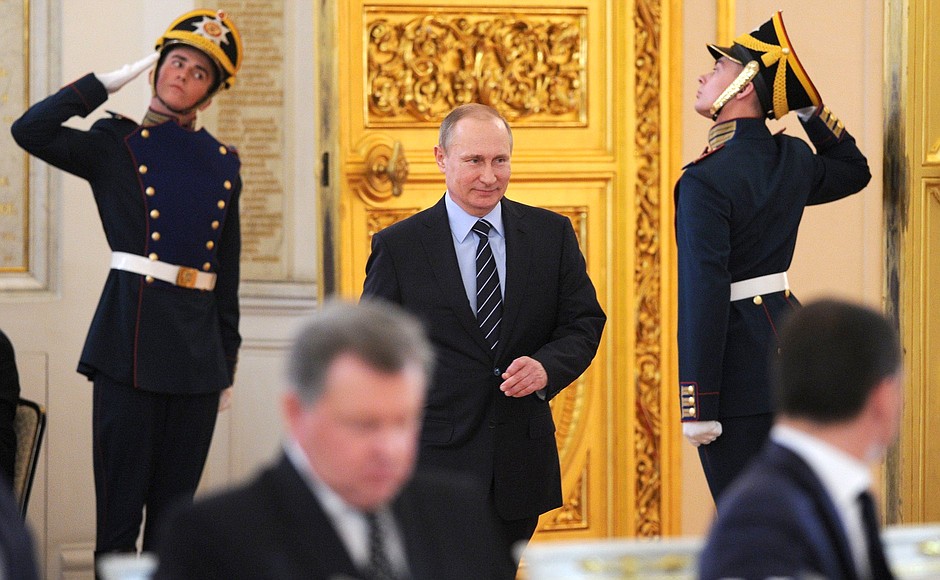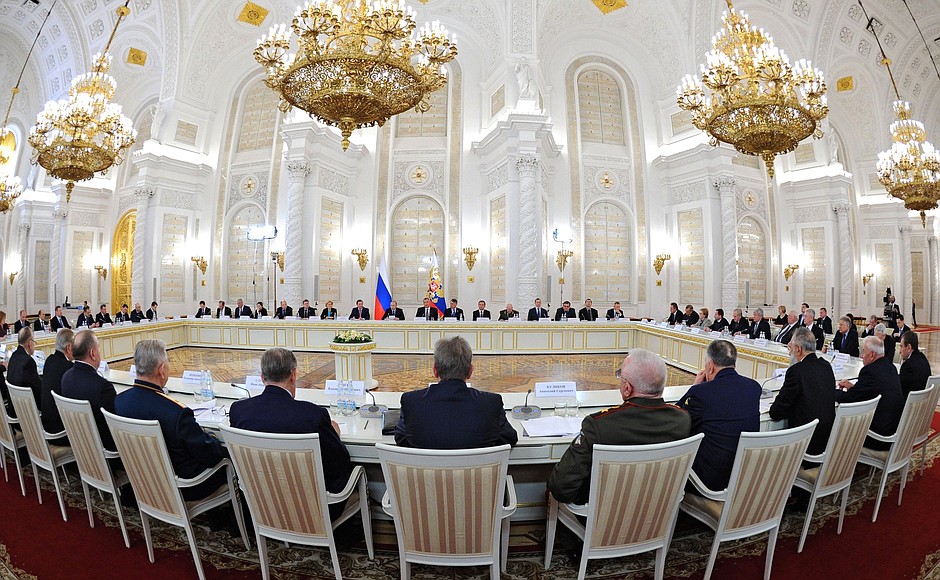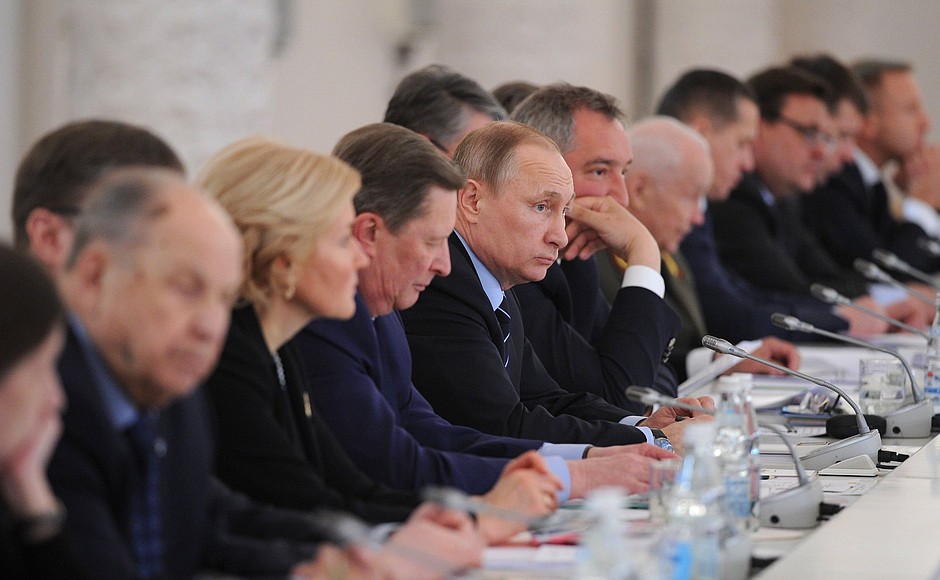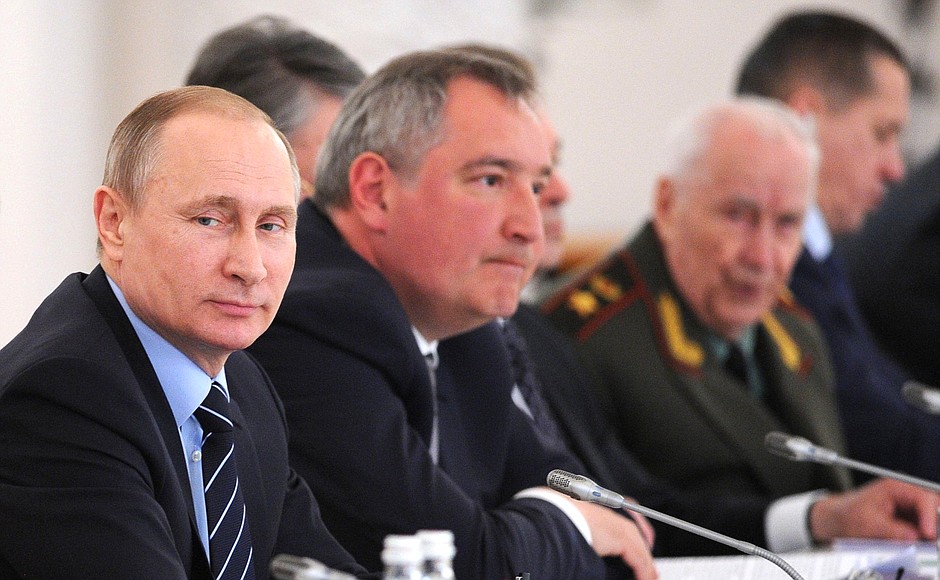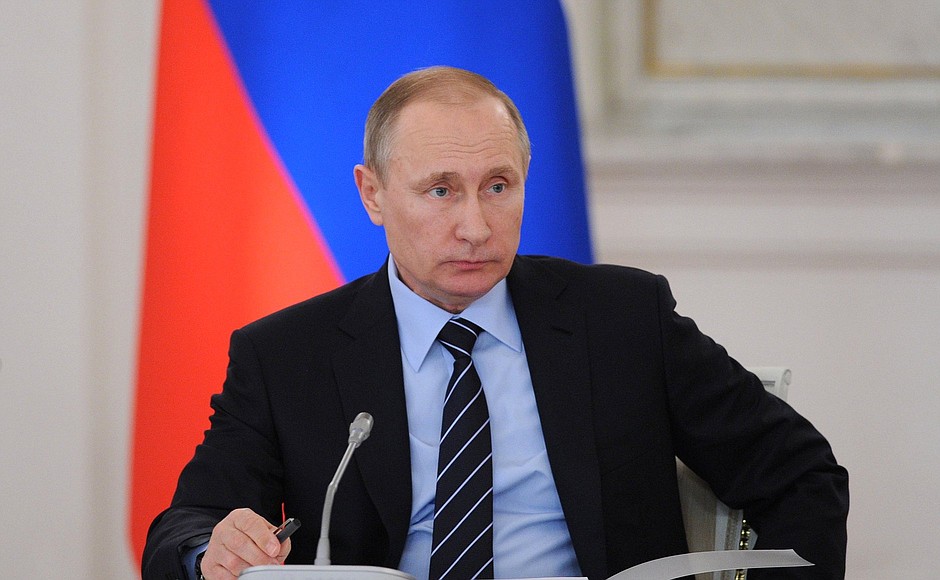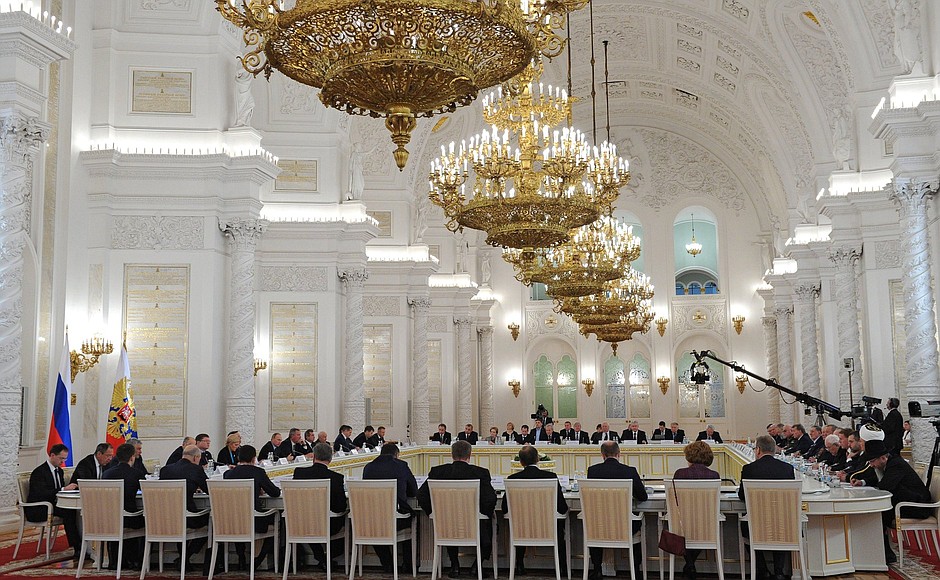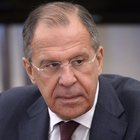Great Patriotic War veterans and heads of veteran and youth public organisations took part in the meeting.
* * *
Excerpts from transcript of Pobeda (Victory) Organising Committee meeting
President of Russia Vladimir Putin: Good afternoon, colleagues,
We had the opportunity to meet on the eve of the 70th anniversary of Victory celebrations and I am sure we all share the view that these events were held at the highest level. The celebrations received tremendous public response and, most important, allowed us to remember again the heroes of the Great Patriotic War, render them their fully deserved honours and unite our citizens around real, meaningful values. During these festive days we felt even more profoundly that we are a united nation, proud of our history and traditions.
I would like to thank all those who took part in preparing for and carrying out the anniversary, including the members of the Victory Committee and the Organising Committee-70 that was created specifically for this momentous date.
It is important that you managed to choose and ensure the fruition of many outstanding, meaningful and useful initiatives. Suffice to mention your assistance in creating the Defence Ministry’s website “Memory of the Nation” that opened up public access to millions of archive pages on Soviet servicemen and prisoners of Nazi death camps.
Of course, the Victory Organising Committee should continue to cooperate under this project with the Defence Ministry and through the Commission for Identification and Preservation of Military and History Sites and Fortifications. Established by decision of the Victory Committee, this commission will also oversee the registration and transfer to museums of unique wartime items that have remained at the site of battles or have been stored at army depots.
Mr Ivanov [Sergei Ivanov, Chief of Staff of the Presidential Executive Office] has recently attended the launch of the Memory Watch commemorative event and a conference of the Russian Search Movement in Tula. The search groups have outlined several issues, including the preservation of our material heritage. I am asking you to draft instructions to address these issues. Of course, we must support those who are doing this important work.
One more project that has been supported by the Victory Committee and that deserves the highest praise is the Immortal Regiment, a nationwide initiative that brought together 12 million people on May 9 of last year, both in Russia and abroad. It is an absolutely honest and sincere project – it should remain the same and be able to develop freely.
Of course, we must support it just as any other positive civil initiatives that encourage interest in our history, nature and the preservation of our cultural heritage, and inspire us to creative endeavours.
There is large demand for such initiatives in our society, as is evidenced by the development of volunteer services. The Volunteers of Victory movement that was created for the 70th Anniversary of Victory now has over 150,000 members. They continue to help veterans, take care of wartime memorials and take part in hundreds of events across Russia every year.
Patriotism is the love you have for your country and the spirit of sincerity and unity, which prevailed in society in the year of the 70th anniversary of Victory, and this feeling of patriotism can also be inspired by examples of selfless devotion to a cause.
Of course, the Great Patriotic War and the wartime generations are the best examples of this. But there have been many other epic and breakthrough events in our history, such as space exploration, industrialisation and the achievements of our culture and science. All of these form our national heritage, which rests on the solid foundation of those who made amazing discoveries, worked hard and created great works of art.
The Organising Committee and the Commission for Veteran Affairs should continue working to fulfil at least two major tasks.
The first task is to support our veterans. We must help implement state policy in this respect, and, on the geopolitical plane, we must help those who contributed to the victory over Nazism. We need to inspire the public to help implement state policy in this respect by facilitating access to healthcare and social services for our veterans, regardless of their place of residence.
The second task is to create conditions for involving more veterans in working with young people, including within the framework of the state programme Patriotic Education of Russian Citizens for 2016–2020.
The programme was first adopted in 2001 and has helped launch many sports, museum and research projects and has given a new meaning to the unique Russian tradition of working with younger generation.
I believe that large educational organisations, such as the Russian Geographical Society or the Russian Historical Society, should be more actively involved in the implementation of this programme. They have very good resources that can be used in the patriotic upbringing of our youth and can cooperate very productively with, among others, the Victory Organising Committee.
I firmly believe that patriotic education should be not only part of a coherent state system but above all an organic part of society’s life. Only by pooling our efforts and consolidating the best practices and initiatives will we be able to bring up generations that know their country, feel involved in its fate, share the responsibility for its future and, most importantly, believe in it.
I would like to note another important thing. We must consistently uphold the historical truth; we often talk about this. It is vital to cut short any attempts to besmirch and falsify the past, including [attempts to] belittle our country’s decisive role in routing Nazism.
These are the most important areas of activity for the Victory Organising Committee, government agencies, including the Foreign Ministry, as well as public, educational and research organisations.
<…>
Foreign Minister Sergei Lavrov: Mr President, colleagues,
Last year, despite the attempts by Western countries to downplay the importance of the celebrations in Moscow, we secured significant international participation in the celebration of the 70th anniversary of Victory in the Great Patriotic War and widely promoted the theme of the Great Victory. We can see that the Western information campaign against Russia is continuing; there are on-going attempts, as part of this campaign, to use the WWII issue for media attacks against our country.
In this situation, disseminating objective information about our country’s decisive contribution to routing Nazism and consistently promoting the thesis of the inadmissibility of revising the results of Victory remain an undisputed priority for the Foreign Ministry in conjunction with other agencies involved in international activity.
We pay special attention to efforts within the framework of international organisations. I am pleased to note the invariably increasing support of the UN General Assembly Resolution entitled Glorification of Nazism: Inadmissibility of certain practices that contribute to fuelling contemporary forms of racism, racial discrimination, xenophobia and related intolerance, adopted upon our initiative every year. This resolution has a long title but the gist is clear. Last December, it was supported by 133 states and the number of its co-authors grew to 52.
We regularly raise the issue of preserving historical memory in other multilateral agencies, including the Organisation for Security and Cooperation in Europe (OSCE) and the Council of Europe, coordinating our steps with parliamentarians of the Federal Assembly of the Russian Federation. We focus our attention on enhancing the coordination of actions with our partners in the Commonwealth of Independent States (CIS).
The Great Victory Achieved by Unity International Forum of Victors is held every year. This year, it will take place outside Russia – in Minsk – for the first time. Naturally, the CIS regularly observes anniversaries of major events of the Great Patriotic War on the basis of decisions adopted by national leaders. This year the 75th anniversary of the Battle for Moscow will occupy a central place in these efforts.
To promote our positions in the media space, Russia’s Foreign Ministry launched a history and records web-resource, USSR and its Allies, on its website. It contains documents from the ministry’s archives on foreign policy and the diplomacy of leading powers of the anti-Hitler coalition.
A special online exhibition on the Foreign Ministry’s website is dedicated to the 70th anniversary of the International Military Tribunal at Nuremberg. To this end, we actively collaborate with the Federal Archives Agency, the Russian Historical Society, the Russian Military History Society, the Academy of Sciences, expert communities and the media.
Interaction with our compatriots abroad is of significant help in this work. Representatives of Russian-speaking communities actively participate in various campaigns, such as St George’s Ribbon and the Immortal Regiment, engage in search and memorial activities and seek to bring objective information about the events of those years home to the broad public in host countries. This cooperation received an additional impetus from the 5th World Congress of Compatriots that took place in Moscow last November.
The Foundation for Supporting and Protecting the Rights of Compatriots Living Abroad also makes a contribution to the overall efforts. Among other things, this concerns assistance to people persecuted for activities related to anniversaries of landmark dates of the Great Patriotic War.
Joint history expert commissions established with a number of states also play an important role in our work. I’d like to note that, in conjunction with Germany, in the framework of one such commission, a textbook has been published where the majority of chapters are coordinated, but some chapters provide alternative points of view. We consider this practice useful and are determined to continue it together with the Academy of Sciences and the Institute of General History.
Needless to say, the campaign launched in a number of European countries to demolish monuments to Soviet citizens who fell in the fight against Nazism arouses particular concern. This anti-Russia race is led by Poland where 30 monuments symbolising not only the Red Army’s liberation mission but also the Soviet-Polish brotherhood in arms were defaced or illegally dismantled. What is more, today the Institute of National Remembrance, which is a Polish state institution, pushes for decisions that will be tantamount to the demolition of all monuments that are unrelated to war burials.
The Russian Foreign Ministry takes all necessary steps, both on a bilateral basis and through the relevant international agencies, to counter this unacceptable line.
We will continue to promote the preservation and maintenance of military burial and memorial sites abroad in cooperation with veteran, anti-fascist and religious organisations in other countries. We believe it is important to do more to consolidate the bilateral legal framework regarding military burial sites abroad. We have a work plan to this end.
Notably, eight monuments to Soviet soldiers were erected in 2015, including those in France and Serbia, in cooperation with the Military Historical Society.
We intend to continue to work consistently and resolutely, and to coordinate our decisions with our associates, including member states of the CSTO, CIS, EAEC, BRICS and the SCO, as well as Israel. In addition, of course, we will continue to promote the idea of an alliance between the Soviet Union, the United States and the United Kingdom. Our veteran organisations have done a lot in this area.
<…>
Vladimir Putin: We have heard several proposals here, some of which we will implement, starting with what has been said about using the experience of the early days of the Great Patriotic War. I am referring to relocating our defence enterprises.
Modern methods of warfare are such that no one will have to relocate, but reviewing how industrial manufacturing was organised, especially in the defence sector, certainly makes sense. We must understand what we need to do and how to do it. Therefore, looking to the past, to the positive experience of the past, makes perfect sense.
The social and educational, as well as the research and practical, aspects of this work, which needs to be done to have our people keep in their historical memory that which was accomplished during the Great Patriotic War, is important for us all, as is using this positive background for the future of our country and for patriotic education.
I want to thank you all again, and I look forward to continuing our joint work.
